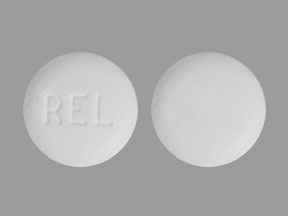Relistor Drug Interactions
Currently displaying a list of 24 drugs known to interact with Relistor (methylnaltrexone).
- 23 moderate drug interactions
- 1 minor drug interaction
Medications known to interact with Relistor
Note: Showing generic names only.
Relistor alcohol/food interactions
There is 1 alcohol/food interaction with Relistor (methylnaltrexone).
Relistor disease interactions
There are 3 disease interactions with Relistor (methylnaltrexone) which include:
More about Relistor (methylnaltrexone)
- Relistor consumer information
- Check interactions
- Compare alternatives
- Pricing & coupons
- Reviews (61)
- Drug images
- Side effects
- Dosage information
- During pregnancy
- FDA approval history
- Drug class: peripheral opioid receptor antagonists
- Breastfeeding
- En español
Related treatment guides
Drug Interaction Classification
| Highly clinically significant. Avoid combinations; the risk of the interaction outweighs the benefit. | |
| Moderately clinically significant. Usually avoid combinations; use it only under special circumstances. | |
| Minimally clinically significant. Minimize risk; assess risk and consider an alternative drug, take steps to circumvent the interaction risk and/or institute a monitoring plan. | |
| No interaction information available. |
See also:
Amitiza
Amitiza (lubiprostone) is used to treat chronic constipation and irritable bowel syndrome with ...
Movantik
Movantik reduces constipation caused by opioid pain medicine used to treat severe chronic pain. It ...
Botox
Botox is used for cosmetic purposes and to treat overactive bladder symptoms, urinary incontinence ...
Symproic
Symproic (naldemedine) is used to treat constipation caused by opioid pain medicine. Symproic is ...
Naldemedine
Naldemedine is used for constipation, opioid-induced constipation
Naloxegol
Naloxegol is used for constipation, constipation, chronic, constipation, drug induced ...
Lubiprostone
Lubiprostone is used for chronic idiopathic constipation, constipation, irritable bowel syndrome ...
Further information
Always consult your healthcare provider to ensure the information displayed on this page applies to your personal circumstances.


